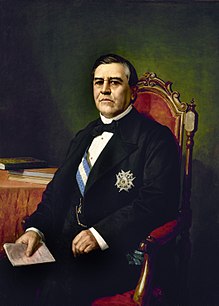Juan Bravo Murillo
| Juan Bravo Murillo | |
|---|---|

Portrait by Manuel García Hispaleto
|
|
|
President of the Council of Ministers of Spain |
|
|
In office January 14, 1851 – December 14, 1852 |
|
| Monarch | Isabella II |
| Preceded by | Ramón María Narváez |
| Succeeded by | Federico Roncali |
| President of the Congress of Deputies of Spain | |
|
In office 1858-01-11 – 1858-05-13 |
|
| Preceded by | Francisco Martínez de la Rosa |
| Succeeded by | Francisco Martínez de la Rosa |
| Member of Congress of Deputies | |
|
In office 1837 – Various non-consecutive terms until 1858. |
|
| Minister of Grace and Justice | |
|
In office January 28, 1847 – March 28, 1847 |
|
| Prime Minister | Carlos Martínez de Irujo, Duke of Sotomayor |
| Minister of Commerce, Instruction, and Public Works | |
|
In office November 10, 1847 – August 31, 1849 |
|
| Prime Minister | Ramón María Narváez |
| Minister of Finance | |
|
In office August 19, 1849 – October 19, 1849 |
|
| Minister of Finance and Development | |
|
In office October 20, 1849 – September 29, 1850 |
|
| Minister of Finance | |
|
In office January 14, 1851 – December 14, 1852 |
|
| President deu of the Congress of Deputies of Spain | |
|
In office January 11, 1858 – May 13, 1858 |
|
| Member of Spanish Senate | |
|
In office 1863 – |
|
| Personal details | |
| Born | June 24, 1803 |
| Died | February 11, 1873 |
| Political party | Moderate Party |
| Profession | Lawyer |
Juan Bravo Murillo (24 June 1803 – 11 February 1873) was a Spanish politician, jurist and economist. He was president of the council of ministers of Spain (equivalent to the present-day position of prime minister / president of the government) from 14 January 1851 to 14 December 1852 during the reign of Isabella II.
Bravo Murillo was born in Fregenal de la Sierra on 24 June 1803. After briefly studying theology, he studied law at the University of Salamanca and the University of Seville, obtaining his licentiate from Seville in 1825. He practiced law for a time in Seville. After the death of Fernando VII in 1833 he was named prosecutor of the Audiencia Provincial of Cádiz, a position he held for two years before moving to Madrid, where he co-published a journal called Boletín de Jurisprudencia. He was also a founder of the conservative newspaper El Porvenir.
He was elected a deputy (member of the lower house of Spain's parliament) in 1837 and 1840 as a member of the Moderate Party. However, his reactionary views kept him out of leadership during the decidedly liberal ascendancy of General Baldomero Espartero, regent during this portion of the minority of Isabella II. He emigrated briefly to France after the Spanish Revolution of 1841, but returned in 1843 after Espartero's fall, the beginning of the década moderada.
...
Wikipedia
